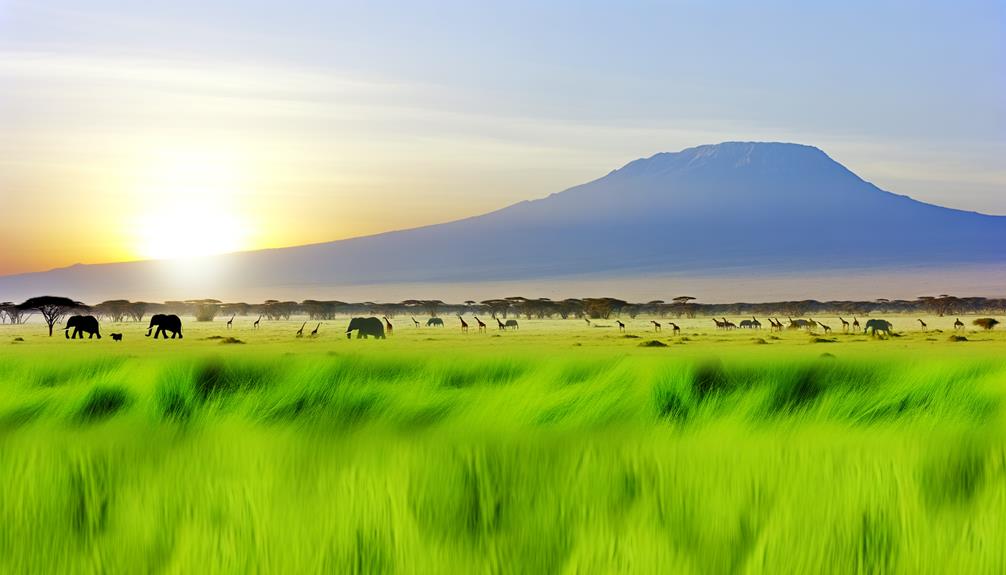Meaning of the Name Kenya
The name 'Kenya' originates from the Kamba people, specifically derived from 'Kĩ-Nyaa.' This term underwent a phonetic shift, becoming 'Kenya' under the influence of European explorers and British colonial administration. The name also traces back to Mount Kenya, originally called 'Kirinyaga' by indigenous Kikuyu people, reflective of its profound geographical and cultural significance.
Over time, the anglicized name 'Kenya' encapsulated a rich tapestry of indigenous, colonial, and post-independence influences, symbolizing national unity and heritage. Exploring this evolution further reveals intricate socio-cultural and linguistic dynamics that have shaped Kenya's national identity.

Key Takeaways
- The name 'Kenya' originates from the Kamba term 'Kĩ-Nyaa.'
- 'Kenya' is an anglicized form of 'Kirinyaga,' referring to Mount Kenya.
- The name reflects a deep connection to the country's geography and natural heritage.
- 'Kenya' was standardized by British colonial administration.
- It symbolizes national pride and unity, uniting diverse ethnic groups.
Etymology of Kenya
The etymology of the name 'Kenya' traces back to the Kamba people, who referred to the region's tallest mountain as 'Kĩ-Nyaa,' meaning 'mountain of whiteness' due to its snow-capped peaks.
This term was later adopted by European explorers and colonizers, transforming into the current designation. The phonetic shift from 'Kĩ-Nyaa' to 'Kenya' highlights the linguistic and cultural interactions that influenced the region's naming.
Additionally, the British colonial administration further solidified the name 'Kenya' during their rule, standardizing it in official documents and maps. The name's development reflects a fusion of native linguistic heritage and colonial impact, capturing a significant aspect of the nation's historical and cultural identity.
Understanding this etymology offers deeper insights into the region's intricate past.
Indigenous Languages
The name 'Kenya' is intricately tied to the country's rich tapestry of indigenous languages, each contributing to its linguistic heritage.
The origin of Kenya's name is believed to be derived from the Kikuyu, Embu, and Kamba words for Mount Kenya, reflecting the significant influence of these ethnic groups.
Moreover, the interplay of various linguistic influences in Kenya underscores the complex, multifaceted nature of its cultural identity.
Origin of Kenya's Name
Kenya's name is believed to have originated from the Kikuyu, Embu, and Kamba people who referred to Mount Kenya as 'Kirinyaga' or 'Kiinyaa,' meaning 'the mountain of whiteness' due to its snow-capped peak.
This nomenclature reflects the indigenous communities' profound connection to the region's geography. The Kikuyu, for instance, revered Mount Kenya as a sacred site, integral to their cultural and spiritual identity.
Over time, linguistic adaptations and colonial interactions led to the anglicized version 'Kenya.' Such etymological evolution underscores the complex interplay between indigenous linguistic traditions and external influences.
Analyzing this origin reveals not only the historical significance of Mount Kenya but also the broader socio-cultural dynamics that shaped the nation's identity.
Linguistic Influences in Kenya
In analyzing the linguistic landscape of Kenya, it is imperative to recognize the profound influence of indigenous languages such as Kikuyu, Luo, and Swahili, each contributing uniquely to the nation's cultural tapestry.
Kikuyu, mainly spoken by the Kikuyu people, enriches Kenya with its oral traditions and folklore.
Luo, the language of the Luo community, carries historical narratives and culturally significant idioms.
Swahili, a Bantu language with Arabic influences, serves as a lingua franca, facilitating communication across diverse ethnic groups.
These languages not only encapsulate the historical and social milieu of their respective communities but also contribute to the dynamic, multi-ethnic identity of Kenya.
Their coexistence underscores the linguistic diversity that is both a heritage and a cornerstone of national unity.
Mount Kenya Connection
Mount Kenya, known as 'Kirinyaga' in the Kikuyu language, serves as the etymological root of the country's name, reflecting its historical and cultural significance.
Today, this majestic peak remains a symbol of national pride and a pivotal element in local traditions and folklore.
Moreover, Mount Kenya's natural beauty and ecological diversity underscore its prominence as an essential environmental and tourism asset.
Origin of Mount Kenya
The etymology of the name Kenya is intricately linked to the prominent geological feature of Mount Kenya, whose name is derived from the Kikuyu word 'Kĩrĩnyaga,' meaning 'the place of whiteness.'
Mount Kenya, an extinct stratovolcano, is the second-highest peak in Africa and serves as a critical landmark in both the geographical and cultural landscapes of Kenya. The mountain's formation dates back to about 3 million years ago during the Pliocene epoch, characterized by volcanic activity. Its glaciated peaks and contrasting equatorial location offer an unparalleled natural spectacle, contributing to its nomenclatural and symbolic importance.
The snow-capped peaks, visible from great distances, likely inspired the Kikuyu's descriptive terminology, cementing the mountain's name in linguistic and cultural heritage.
Cultural Significance Today
Today, the cultural significance of Mount Kenya extends beyond its historical name, deeply influencing various aspects of Kenyan social, spiritual, and economic life. This majestic peak is revered as a sacred site by local communities, particularly the Kikuyu, who regard it as the dwelling place of their god, Ngai. Rituals and ceremonies are often performed to honor this spiritual connection.
Economically, Mount Kenya is crucial, supporting agriculture through its fertile volcanic soils and acting as an essential water catchment area. Socially, it serves as a national symbol of identity and unity, encapsulated in its depiction on the Kenyan flag.
Therefore, Mount Kenya remains integral to the cultural fabric, embodying both ancestral heritage and contemporary significance.
Mount Kenya's Natural Beauty
Renowned for its stunning landscapes, Kenya's highest peak offers a breathtaking array of natural beauty, ranging from lush forests and bamboo zones to alpine moorlands and glacial peaks.
Mount Kenya, Africa's second-highest mountain, is a UNESCO World Heritage site, notable for its ecological diversity and geological significance. The lower slopes are cloaked in dense forests teeming with wildlife, while ascending altitudes reveal a shift to bamboo thickets and heathlands.
Above these, unique Afro-alpine flora such as giant lobelias and groundsels thrive in the moorlands. The summit area, often capped with snow and glaciers, presents a stark, rugged beauty.
This stratification of ecosystems not only underscores Mount Kenya's natural splendor but also its role as a critical water catchment area.
Colonial Influence
Examining the colonial influence on Kenya's name reveals a complex interplay of indigenous and foreign interactions that shaped the nation's identity. The etymology of 'Kenya' is deeply intertwined with the British colonial era, which transformed local nomenclature through administrative and cultural impositions.
This colonial legacy is evident in several key aspects:
- Misinterpretation of Indigenous Names: British colonizers often mispronounced and Anglicized local names, leading to the current name 'Kenya' from 'Kirinyaga,' the Kikuyu name for Mount Kenya.
- Colonial Administrative Practices: The British standardized the name 'Kenya' for ease of governance and international recognition.
- Cultural Imposition: The colonial administration's preference for simplified names facilitated broader communication but often disregarded indigenous linguistic and cultural nuances.
These factors highlight the enduring impact of colonialism on Kenya's identity.
Post-Independence Usage
Following Kenya's independence in 1963, the name 'Kenya' evolved to symbolize national pride and unity, reflecting the country's efforts to establish its own identity separate from colonial legacies.
The post-independence period saw the name 'Kenya' embody a collective aspiration towards self-governance, economic development, and cultural renaissance. National leaders and policymakers utilized the name to promote a cohesive Kenyan identity, transcending ethnic and regional divisions.
Monuments, educational institutions, and national holidays were named to reinforce this newfound sense of unity. The name 'Kenya' served not only as a geographical identifier but also as a potent emblem of sovereignty, resilience, and the ambition for progress.
Its usage underscored the nation's commitment to forging a distinct path on the global stage.
Linguistic Evolution
The linguistic evolution of the name 'Kenya' reflects a fascinating interplay of indigenous languages, colonial influences, and post-independence efforts to standardize and promote the Swahili language as a unifying national medium. Initially derived from the Kikuyu term 'Kirinyaga,' referring to Mount Kenya, the name underwent several transformations:
- Colonial Adaptation: British colonialists anglicized 'Kenya' from local dialects, simplifying pronunciation.
- Swahili Integration: Post-independence, Swahili became the lingua franca, further embedding 'Kenya' within a broader East African context.
- National Identity: Language policies aimed to foster national unity solidified 'Kenya' as a symbol of cultural and linguistic amalgamation.
This multifaceted linguistic journey underscores the dynamic nature of national identity formation.
Cultural Significance
Understanding the cultural significance of the name 'Kenya' requires an exploration of its deep-rooted connections to the region's history, indigenous traditions, and collective identity. Kenya, derived from Mount Kenya or 'Kirinyaga' in Kikuyu, symbolizes the nation's natural heritage and spiritual beliefs. The name encapsulates the country's diverse ethnic tapestry, reflecting the reverence and unity among various communities.
| Aspect | Description | Significance |
|---|---|---|
| Historical Roots | Originates from Mount Kenya (Kirinyaga) | Represents natural and historical legacy |
| Indigenous Traditions | Deeply tied to Kikuyu spiritual beliefs | Embodies cultural and spiritual heritage |
| Collective Identity | Unites diverse ethnic groups under a common name | Symbolizes national unity and pride |
This intrinsic association underscores the profound cultural resonance the name holds.
Global Recognition
Widely acknowledged on the international stage, the name 'Kenya' evokes a rich historical narrative and a dynamic socio-political landscape. This recognition is anchored in several pivotal domains:
- Tourism and Natural Heritage: Kenya is globally renowned for its breathtaking landscapes, including the Maasai Mara and Mount Kenya, drawing millions of tourists annually.
- Sports Excellence: The nation has produced world-class athletes, particularly in long-distance running, earning numerous Olympic and World Championship medals.
- Political and Economic Influence: As a leading economy in East Africa, Kenya plays a significant role in regional politics and economic development, often serving as a diplomatic hub.
These aspects collectively contribute to Kenya's prominent global standing, reflecting a multifaceted identity that commands respect and admiration worldwide.
Conclusion
The name 'Kenya' encapsulates a rich tapestry of etymological roots, indigenous languages, geographical landmarks, and historical influences.
Ironically, while colonial powers sought to impose their own identity on the region, the name 'Kenya' has become a symbol of post-independence pride and cultural resurgence.
The linguistic evolution of the term reflects a journey from external imposition to global recognition, underscoring the complex interplay between power and identity in the formation of national consciousness.






